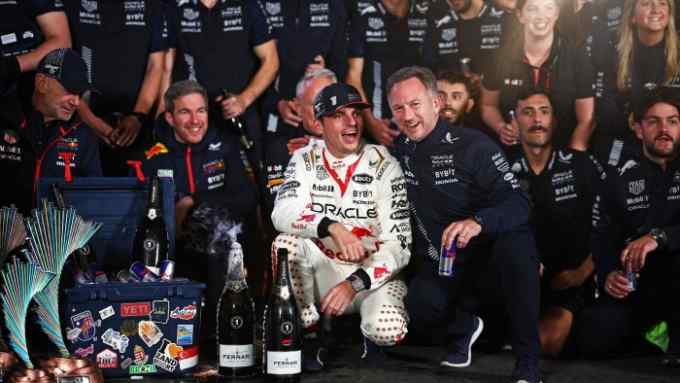Can Max Verstappen’s domination prove bad for F1’s business?

Roula Khalaf, Editor of the FT, selects her favourite stories in this weekly newsletter.
Max Verstappen has sent records tumbling this season in Formula One. Ahead of this weekend’s season finale in Abu Dhabi, the Red Bull Racing driver has already been crowned world champion for a third consecutive year. In the most dominant season by any driver in F1’s 74-year history, Verstappen has won more than 80 per cent of the races.
Domination in F1 is not new: Michael Schumacher and Lewis Hamilton won five and four world titles in a row, respectively. Schumacher clinched the 2004 title as early as July, leaving eight dead rubbers to conclude the season.
But the audiences for F1 have changed since then. The fans of Schumacher’s era might have been satisfied to watch driving excellence week after week. F1, today, risks losing the attention of its younger and more female fans, pulled in by the Netflix hit series Drive to Survive and the proliferation of content creators on TikTok and YouTube.
These new audiences have driven a surge of commercial interest in F1, which this year surpassed a total of 300 active sponsors for the first time. F1 reported revenues of $887mn in the third quarter of 2023 — an increase of 24 per cent year on year. The sport is still growing, but might Verstappen’s domination prove bad for business?
“This is part of the sport — and, when there is a legend that is building up incredible momentum, you just need to congratulate them,” says F1 president and CEO Stefano Domenicali. “On the other hand, F1 is sold out everywhere we go. So interest is growing, despite the fact that Max this year has won almost all the races. Cycles have been always part of F1. But what you can say is we never saw the gaps between the cars being so close.”
The competitiveness of the field behind Verstappen is also highlighted by Zak Brown, CEO of Red Bull’s closest competitor McLaren Racing, as a reason why fan interest remains. “The overall competitiveness of the sport is unlike anything I’ve ever seen — the grid is getting tighter and tighter,” he says. “That said, it would hurt if [Verstappen’s domination] goes on. I don’t think we want to see five, six years of this.”
Although the world title was decided in early October, the viewing figures for the sport have not seen a significant decline, averaging 70mn a race this season. F1 also reports that its social media following has increased by 28 per cent year on year.
There is evidence that the number of conversations around F1 weekends on some social media channels has dipped compared with last season and with the high-water mark of 2021 — when Verstappen and Hamilton’s enthralling duel for the 2021 world title reached its controversial climax in Abu Dhabi.
However, sports research veteran Nigel Geach of Iris Sport notes that, as far as overall audiences are concerned, “Verstappen’s domination of this season so far doesn’t show a significant drop-off in interest compared to when Schumacher wrapped up the 2004 title early, when TV was the primary source of viewing for fans. In 2023, with social media and internet always on, coupled with the fact that the F1 calendar late in the season has multiple races in the Americas, showing in the more favourable evening viewing slots in the main F1 markets in Europe, it means fan interest and media consumption through all channels is stable.”
Red Bull Racing is certainly milking its success, with five Fortune 500 companies among its sponsors, including a $100mn-a-year title partnership with software group Oracle. “They would not have been there previously,” says Red Bull Racing CEO and team principal Christian Horner. “We brought in companies such as ExxonMobil, and Ford was reintroduced to F1 [from 2026]. It’s only because of the popularity of F1 that brands like these are choosing to get involved. And we’ve managed to convert success on [the] track into success on our balance sheet. It’s just been the most phenomenal season.”
Horner sees the way McLaren and others have closed the performance gap on his team since the summer as proof that, next season, the competition will be “tough”. But there are concerns that, with such recent dominance, Red Bull was able to decide, early in the season, to divert its R&D programme to the design of its 2024 car, rather than develop the 2023 car as its rivals continued to do. That could give the team a fresh advantage next year. Horner talks of “diminishing returns”, but another dominant year for Verstappen could prove problematic for the series.
Still, Domenicali remains bullish on F1’s growth prospects. “I think that there is a lot more to come,” he says. “Particularly in the US, where the sport business is huge. Look at the values of the businesses in American sports [the Dallas Cowboys NFL franchise is valued at more than $9bn]. We are humbly entering that world, but now our position in the American market is much bigger. We are moving rapidly.
“We’re just at the beginning of a journey that I believe will take us in terms of growth, popularity and business, to another level.”

Comments